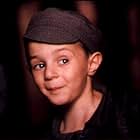When an open-minded Jewish waiter and his son become victims of the Holocaust, he uses a perfect mixture of will, humor and imagination to protect his son from the dangers around their camp.When an open-minded Jewish waiter and his son become victims of the Holocaust, he uses a perfect mixture of will, humor and imagination to protect his son from the dangers around their camp.When an open-minded Jewish waiter and his son become victims of the Holocaust, he uses a perfect mixture of will, humor and imagination to protect his son from the dangers around their camp.

![Watch Trailer originale italiano [OV]](https://m.media-amazon.com/images/M/MV5BNzA1MmVhYjQtZTJiYi00YTRkLWExOTUtODFlNDQ0YzMzZjJlXkEyXkFqcGdeQWpvaG5oYXJ0._V1_QL75_UX500_CR0,47,500,281_.jpg)


































